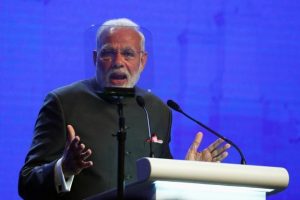 SINGAPORE: Batting vigorously for freedom of navigation and keeping the world’s maritime transit routes free and open amid widespread concerns about alleged militarisation of islands in South China Sea by China, India’s Prime Minister Narendra Modi stressed on “peaceful settlement of disputes in accordance with international law” and underscored New Delhi’s commitment to a rules-based international order.
SINGAPORE: Batting vigorously for freedom of navigation and keeping the world’s maritime transit routes free and open amid widespread concerns about alleged militarisation of islands in South China Sea by China, India’s Prime Minister Narendra Modi stressed on “peaceful settlement of disputes in accordance with international law” and underscored New Delhi’s commitment to a rules-based international order.
“We should all have equal access as a right under international law to the use of common spaces on sea and in the air that would require freedom of navigation, unimpeded commerce and peaceful settlement of disputes in accordance with international law,” Mr Modi said at the Shangri La Dialogue, Asia’s premier defence and security dialogue forum, in Singapore on June 1.
“When we all agree to live by that code, our sea lanes will be pathways to prosperity and corridors of peace.”
In his speech, Mr Modi outlined India’s geopolitical strategy of ensuring freedom of navigation through proactive cooperation with ASEAN countries and bolstering capability of friends and partners in the Indo-Pacific region, including Vietnam, Mauritius and Seychelles.
 Although Mr Modi rejected any China containment strategies on India’s part, he spoke in detail about how India is bolstering defence capabilities of friends and partners like Vietnam to ensure freedom of navigation and to shape a pluralistic and inclusive Indo-Pacific region. Mr Modi specifically cited India’s burgeoning development and strategic partnership with Vietnam with a view to curbing China’s assertiveness in the region.
Although Mr Modi rejected any China containment strategies on India’s part, he spoke in detail about how India is bolstering defence capabilities of friends and partners like Vietnam to ensure freedom of navigation and to shape a pluralistic and inclusive Indo-Pacific region. Mr Modi specifically cited India’s burgeoning development and strategic partnership with Vietnam with a view to curbing China’s assertiveness in the region.
“We work with partners like Vietnam to build mutual capabilities,” he said.
Vietnam has been in the forefront of accusing China of militarising South China Sea islands and subverting what Hanoi sees as its legitimate sovereignty over the contested Spratly Islands and Paracel. During his visit to Vietnam in September 2016, Mr Modi had announced a massive concessional finance package of $500 million for strengthening Vietnam’s defence apparatus and development projects.
Vietnam’s Defence Minister is also participating in the Shangri-La Dialogue 2018, and is expected to seek about the South China Sea issue on June 2.
Alluding to his doctrine of SAGAR as a prototype of an inclusive maritime order underpinned by a ruled-based order, Mr Modi said: “Three years ago, in Mauritius, I described our vision in one word – Sagar, which means ocean in Hindi. And, Sagar stands for Security and Growth for All in the Region and, that is the creed we follow to our East now even more vigorously through our Act East Policy by seeking to join India, especially her East and North-East, with our land and maritime partners to the east.”
Mr Modi’s impassioned advocacy of freedom of rules-based maritime order came amid a raging verbal duel between Washington and Beijing over the US’ freedom of navigation operations by the US warships in the South China Sea.
Author Profile

- Manish Chand is Founder and Editor-in-Chief of India Writes Network (www.indiawrites.org) and India and World, a pioneering magazine focused on international affairs. He is CEO, Centre for Global India Insights, an India-based think tank focused on global affairs.
Latest entries
 India and the WorldFebruary 17, 2026South-by-South: Focus on people-centric solutions at India AI summit
India and the WorldFebruary 17, 2026South-by-South: Focus on people-centric solutions at India AI summit India and the WorldFebruary 7, 2026Modi hails interim India-US trade deal, Goyal says no concessions made on agriculture
India and the WorldFebruary 7, 2026Modi hails interim India-US trade deal, Goyal says no concessions made on agriculture India and the WorldFebruary 2, 2026Trump announces trade deal with India, Modi ‘delighted’
India and the WorldFebruary 2, 2026Trump announces trade deal with India, Modi ‘delighted’ India and the WorldJanuary 31, 2026Palestinian minister bats for mediatory role for India in ending Gaza conflict
India and the WorldJanuary 31, 2026Palestinian minister bats for mediatory role for India in ending Gaza conflict







